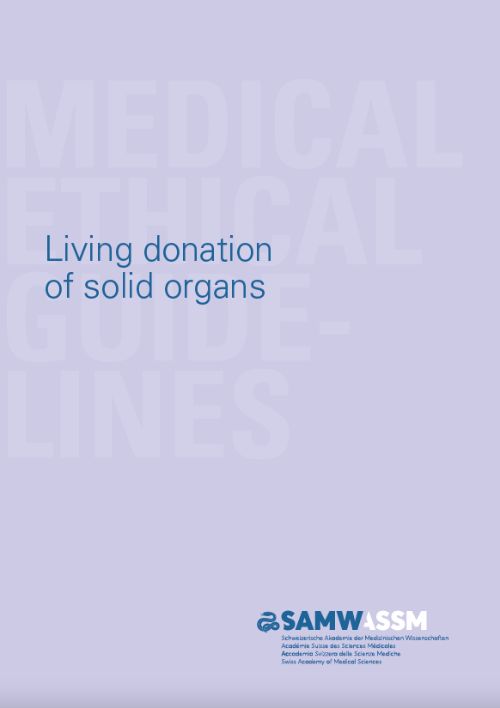Living donation presents an exceptional medical-ethical situation: A healthy person undergoes a surgical intervention to donate an organ or parts thereof to another person. The guidelines «Living Donation of Solid Organs» (2023) provide assistance to physicians, nurses, and other health professionals involved in the medical and psychosocial assessment of donors and in their aftercare.
In living donation, donors make an organ available for transplantation while they are still alive. To do so, an operation is performed on a healthy individual for the benefit of another person (usually a relative). This gives rise to particular ethical challenges.
To support physicians, nurses and other health professionals, the SAMS published medical-ethical guidelines on this topic as early as 2008. The revision of the Federal Act on the Transplantation of Organs, Tissues and Cells (Transplantation Act) and developments in medicine and society have made an update of the guidelines necessary. The revised version was published in August 2023.
Cross-over living donation of kidneys
The revised guidelines newly address the ethical and practical aspects of so-called «cross-over» living donation. This process involves the cross-exchange of kidneys between two or more pairs, for instance, when direct donation between spouses is impossible due to incompatibility. The guidelines state that in the assessment interview it must be determined whether the donor has understood and accepted the distinctive psychosocial characteristics of living kidney donation within the Swiss Cross-Over Living Donation programme.
Donors with residence abroad
In addition, the SAMS guidelines deal with the assessment of living donors resident abroad. They follow the resolutions from the Council of Europe. The same rules apply to all people who are willing to donate: They must receive oral and written information in a lay-friendly language. Certain aspects, however, may be difficult to verify. The guidelines therefore offer assistance on how to provide information in complex settings.
Amendments to the next revision of the Transplantation Act
The guidelines are based on the current legal framework. However, the Transplantation Act is currently under revision. Once the final revised version is known (probably in 2026), the guidelines will be adapted accordingly. If the guidelines are not changed substantially, no new public consultation will be carried out.
All SAMS guidelines can be found in the menu Publications.
